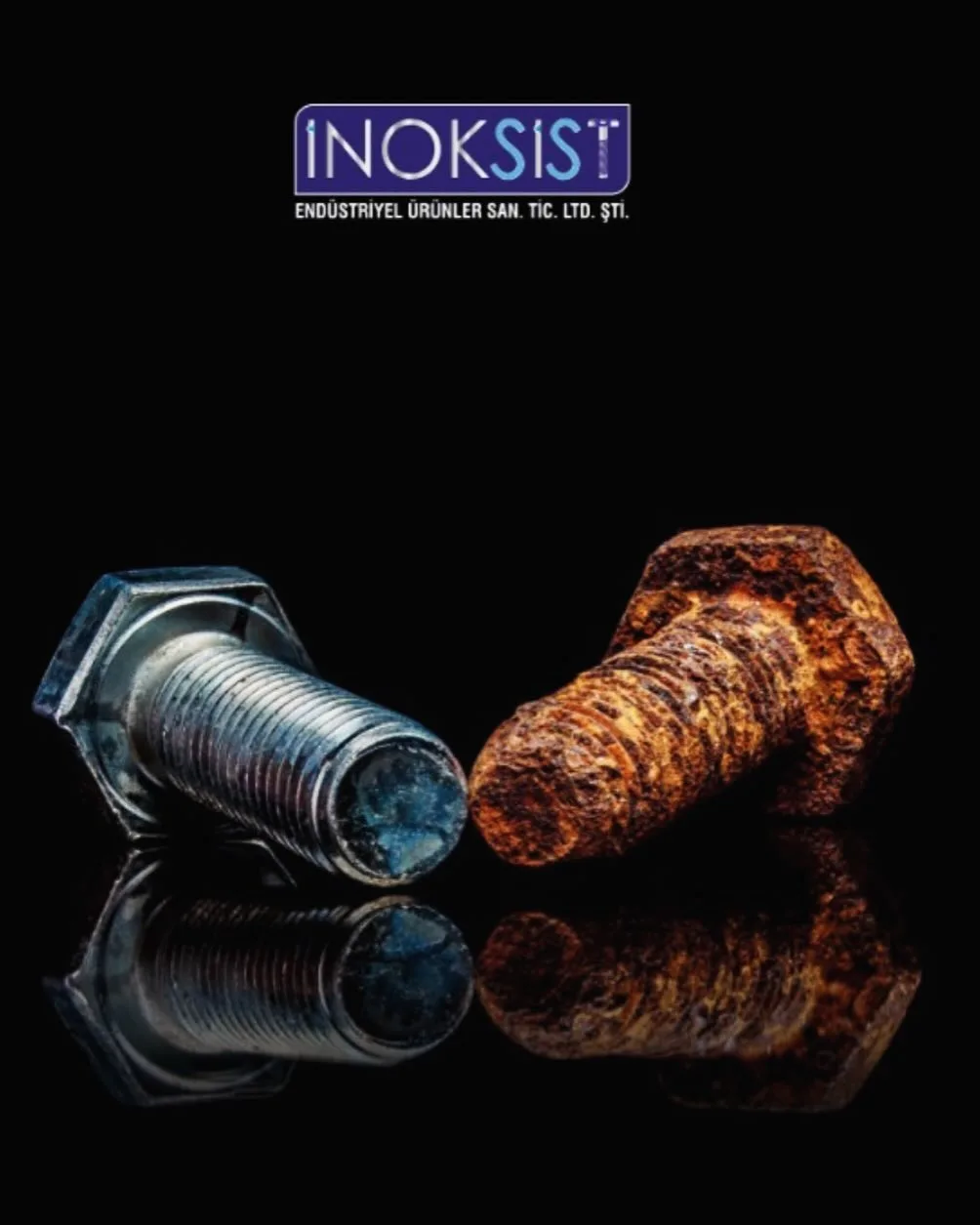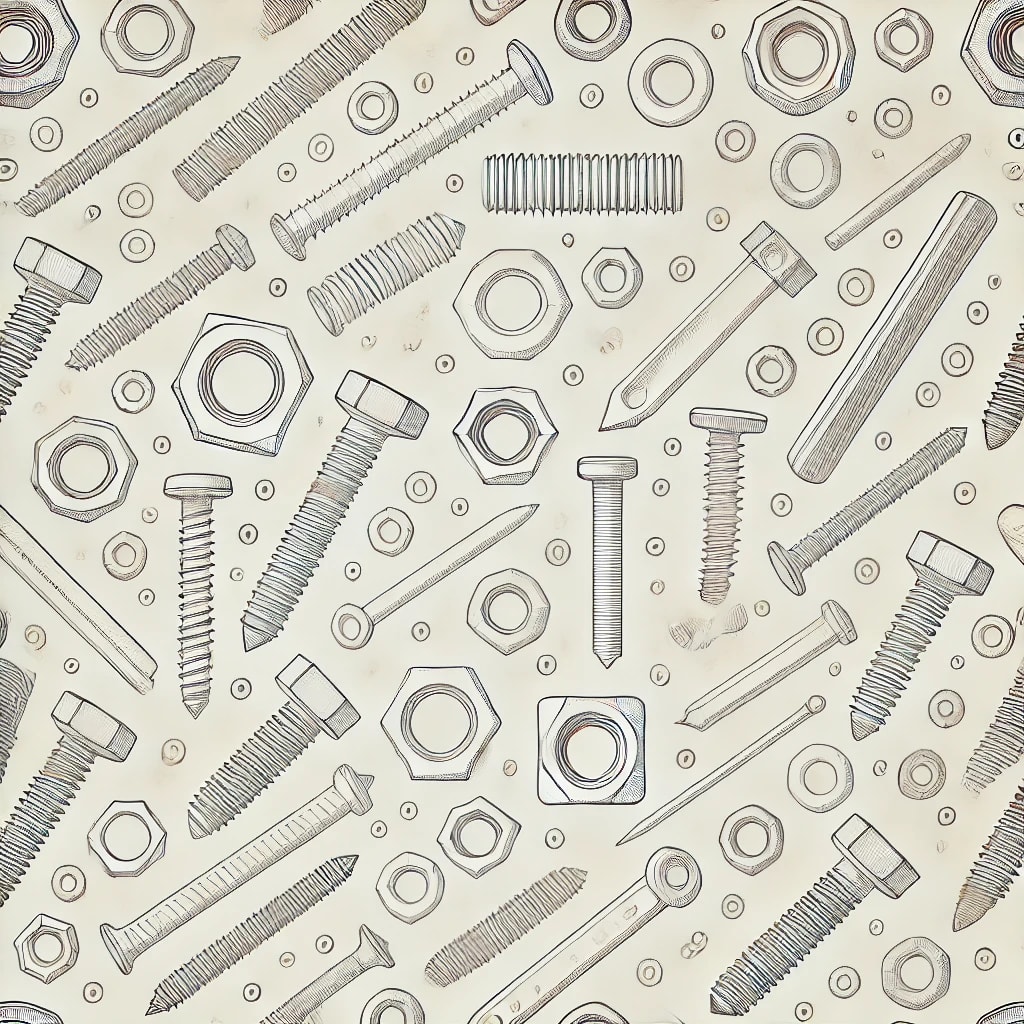
Stainless Steel Bolt and Nut: Durable and Reliable Fastening Solutions
Stainless steel bolts and nuts, also known as Inox bolts and chrome bolts, are widely used fastening elements due to their durability, corrosion resistance, and long lifespan. These fastening components play a critical role in ensuring strong and long-lasting assemblies, especially in humid and corrosive environments. Stainless steel bolts and nuts are commonly used in industries such as construction, automotive, marine, food, and machinery. The high strength provided by stainless steel ensures secure connections and enhances resistance to external factors. Since the choice of the right quality and material directly affects the strength of the connection, selecting stainless steel fasteners suitable for the intended use is of great importance. In this article, we will explore the types of stainless steel bolts and nuts, their applications, and key considerations when selecting them in detail.
What Are Stainless Steel Bolts and Nuts?
Stainless steel bolts and nuts are fastening elements that provide high durability and corrosion resistance. Also known as Inox bolts and chrome bolts, these products are made from stainless steel, offering a long-lasting solution against corrosive external factors. The chromium and nickel alloys in their composition create a protective layer on the surface, preventing oxidation. Thanks to these properties, they can be safely used in environments exposed to moisture or chemicals.
Stainless steel bolts are preferred for creating mechanically strong connections. While standard steel fasteners may rust or wear over time, stainless steel nuts and bolts maintain their surface integrity for an extended period, enhancing the reliability of the assembly. In systems exposed to vibrations or heavy loads, loose or deformed connections can pose significant risks. Stainless steel fasteners minimize these issues, ensuring a secure and long-lasting assembly.
The use of Inox bolts and nuts also offers advantages in applications where aesthetics and functionality must coexist. Their bright and smooth surface allows for assembly without compromising the appearance of structures or equipment. Additionally, their resistance to high temperatures and harsh environmental conditions reduces long-term maintenance needs, providing a cost advantage.
Advantages of Stainless Steel Bolts and Nuts
1. Corrosion Resistance: Stainless steel alloys are resistant to water, moisture, and chemicals, minimizing the risk of rust and oxidation.
2. High Durability: Stainless steel bolts and nuts provide reliable connections even under heavy loads due to their high mechanical strength.
3. Long-Lasting Use: Compared to standard steel fasteners, they have a much longer lifespan, resist harsh environmental conditions, and require minimal maintenance.
4. Aesthetic Appearance: Their bright and smooth surface makes them ideal for decorative applications, ensuring a visually high-quality assembly.
5. High Temperature Resistance: Stainless steel bolts and nuts maintain their structural integrity even under high temperatures, ensuring safe connections.
6. Low Maintenance Cost: Their corrosion-resistant structure eliminates the need for regular maintenance, offering a cost advantage in the long run.
7. Environmentally Friendly: Made from recyclable materials, they provide a sustainable and eco-friendly solution.
8. Wide Range of Applications: They are widely used in industries such as construction, automotive, maritime, food, chemical, and machinery manufacturing.
Applications of Stainless Steel Bolts and Nuts
Stainless steel bolts and nuts are widely used in industries that require high durability and corrosion resistance. Their sturdy structure provides long-lasting and reliable connections.
Construction and Building Sector: Stainless steel fasteners play a crucial role in bridges, buildings, steel structures, and infrastructure projects. They are especially preferred in structures exposed to outdoor conditions due to their resistance to rust.
Automotive and Transportation: Stainless steel bolts and nuts used in vehicle engines, chassis connections, and exhaust systems are resistant to high temperatures and vibrations. They are also commonly used in rail systems, shipbuilding, and the aviation industry.
Maritime and Shipbuilding Industry: Stainless steel bolts and nuts are resistant to the corrosive effects of saltwater, making them ideal for ship hulls, yacht fittings, and offshore platforms.
Food and Chemical Industry: Due to their hygienic properties and resistance to chemicals, they are widely used in food production facilities and chemical processing plants. Their stainless surface allows for easy cleaning and compliance with hygiene standards.
Machinery and Manufacturing Industry: In heavy industrial machinery, production lines, and factories, chrome bolts and nuts are of critical importance due to their resistance to wear and pressure.
Energy and Renewable Resources: Stainless steel bolts are used in wind turbines, solar panels, and other energy systems to provide strong and long-lasting connections.
Types of Stainless Steel Bolts
Stainless steel bolts are manufactured in various forms to meet different industrial needs and applications. They come in different types based on material quality, head shape, and thread design. Here are the most common types of stainless steel bolts:
1. Hex Head Bolts: The standard and most commonly used type of bolt. Its hexagonal head allows for easy tightening with a wrench, ensuring a strong connection.
2. Allen (Socket Head) Bolts: These bolts have a recessed socket in the head that can be tightened with an Allen key. Their compact design makes them ideal for use in tight spaces.
3. Flange Bolts: Designed with a washer-like wide surface at the head, they provide better pressure distribution across the connection.
4. Torque Bolts: Preferred for high-strength applications, especially in the automotive and machinery industries.
5. Eye Bolts: Featuring a loop at the end, these bolts are commonly used in lifting and suspension systems.
6. U-Bolts: U-shaped bolts designed to secure pipes and round profiles in place.
7. Knurled Head Bolts: Ideal for hand-tightened applications where tools are not required, commonly used for precise adjustments.
8. Wing Bolts: Designed for easy manual tightening, often used in temporary connections.
9. Stainless Steel Stud Bolts: Featuring threads on both ends, these bolts provide extra strength in assembly processes and are widely used in heavy industrial applications.
Due to their durability and corrosion resistance, stainless steel bolts are widely preferred across various industries. Selecting the right bolt for the application ensures long-lasting and reliable connections during the assembly process.
Types of Stainless Steel Nuts
Stainless steel nuts are manufactured in various designs to suit different applications. They come in different types based on usage, thread structure, and durability requirements. Here are the most common types of stainless steel nuts:
1. Hex Nut: The most commonly used type of nut. Its standard hexagonal shape allows for easy tightening with a wrench, providing a secure connection.
2. Flange Nut: Features a wide, washer-like surface at the base, increasing surface contact and enhancing the stability of the connection.
3. Lock Nut: Designed to prevent loosening by using a double-nut mechanism. Ideal for secure connections in vibrating environments.
4. Nylon Insert Lock Nut: Contains a nylon ring inside to prevent loosening. Commonly used in automotive, machinery, and aerospace industries.
5. Wing Nut: Can be tightened manually, allowing for quick assembly. Preferred in temporary connections and applications requiring frequent adjustments.
6. Butterfly Nut: Easy to use and does not require tools. Suitable for connections that need to be frequently assembled and disassembled.
7. Square Nut: Offers a broad surface area with its four-sided design. Used in structural applications and specialized mounting systems.
8. Cap Nut: Closed on one side to prevent the bolt from protruding. Often used in decorative and precision applications.
9. Weld Nut: Designed to be welded onto metal surfaces for a permanent and strong attachment. Widely used in the automotive and construction industries.
Stainless steel nuts are widely preferred across various industries due to their durability and corrosion resistance. Choosing the right nut enhances the strength and reliability of connections, ensuring long-term performance.
Key Considerations When Choosing Stainless Steel Bolts and Nuts
The selection of stainless steel bolts and nuts is crucial to ensuring that fasteners are long-lasting, reliable, and durable. First and foremost, the appropriate material must be chosen for the intended environment. Stainless steel comes in different grades, each offering varying levels of resistance. For example, A2 stainless steel provides sufficient protection in humid environments, whereas A4 stainless steel performs significantly better in highly corrosive conditions such as seawater, chemical exposure, and high temperatures. Selecting the right grade for your application enhances the durability of the connection.
Another important factor is choosing the correct size and thread type for the bolt and nut. The thickness of the surfaces being fastened and the hole diameter play a key role in determining the appropriate bolt length and diameter. Additionally, selecting between fine or coarse threads can directly impact the mechanical strength of the connection. Fine-threaded stainless steel bolts are more resistant to loosening in high-vibration environments, whereas standard-threaded models offer a broader range of applications. Choosing the wrong size fastener can lead to installation failures and problems such as loosening over time.
Finally, the surface coatings and additional features of stainless steel bolts and nuts should also be considered. Some stainless steel fasteners are reinforced with special coatings to provide extra corrosion resistance. For instance, PTFE-coated stainless steel bolts reduce friction, allowing for easier installation while offering protection against external factors. Additionally, self-locking systems, such as locking nuts, enhance fastening security, particularly in high-vibration environments. Opting for stainless steel fasteners with the appropriate features for your application and environmental conditions not only simplifies the assembly process but also ensures long-term durability.
Maintenance and Longevity Tips for Stainless Steel Bolts and Nuts
Stainless steel bolts and nuts are durable fasteners that can be used safely for many years. However, regular maintenance is essential to maximize their lifespan and maintain their performance. Although stainless steel is resistant to corrosion, dirt, salt, and other abrasive substances can accumulate on its surface over time, especially when exposed to harsh environmental conditions. Therefore, it is important to clean bolts and nuts regularly. Neutral pH detergents or specialized stainless steel cleaners can be used for cleaning. Avoid using abrasive chemicals or hard brushes, as these can cause scratches on the surface, damaging the protective oxide layer of the stainless steel.
Another important aspect of maintenance is ensuring the correct torque values during assembly. Over-tightening stainless steel bolts and nuts can create excessive stress on the material, leading to breakage or deformation over time. For fasteners exposed to vibrations, the use of locking nuts or thread adhesives can help minimize the risk of loosening. Additionally, the surfaces where stainless steel fasteners are installed should be clean and smooth. Dirt or metal burrs can damage the threads during assembly, reducing the durability of the connection. Regular maintenance and checking the tightness of bolts and nuts help prevent loosening, ensuring a secure and stable installation.
Taking additional protective measures against environmental factors can further extend the lifespan of stainless steel bolts and nuts. If fasteners are exposed to saltwater, humid air, or chemical vapors, coatings or lubricants can provide extra protection. For example, a thin layer of PTFE or ceramic coating reduces friction, making it easier to install and remove fasteners while also protecting the surface from wear and tear. Moreover, stainless steel bolts used in outdoor environments should be periodically inspected, and any loosened or worn-out parts should be replaced. These routine maintenance practices not only enhance the safety of fasteners but also help reduce long-term costs.
For more information on our corrosion-resistant and long-lasting stainless steel bolts and nuts: contact us
